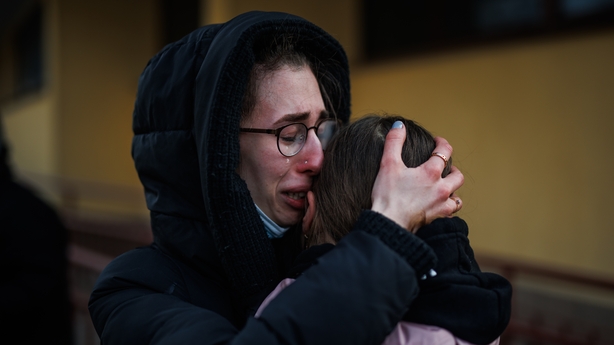The Ukrainian refugees disembarked briskly from the packed train and emerged into the cold afternoon sunshine in Przemysl - what up to now has been a quiet town in southeast Poland.
It was immediately noticeable that these latest refugees into Poland were solely women and children - their husbands, partners, sons, brothers, and fathers prevented from crossing the border. Instead, they were to take up arms to fight the might of the Russian armed forces.
There were many emotions on show - relief, tears and laughter within the same family group at the same time.
Some were collected by friends and family. Others wanted to get to the ticket desk and continue their journey. Still more seemed to just need to take a moment.
Everyone waiting at the station was there to help. Police officers carried suitcases downstairs for the new arrivals.
Volunteers were on hand to pour hot drinks, and serve up soup and sandwiches. There were tables piled high with nappies, toiletries, warm clothing, and toys for the kids.
They had made their way from all over Ukraine, some had been travelling for days. I met families from Lviv, couples from Kyiv and Donetsk, students from Kharkiv, and all told the same story of a Russian onslaught forcing them to flee.
The volume of Ukrainians seeking refuge here in neighbouring Poland, from President Vladimir Putin's war, is mind-boggling.

Poland's border authorities told me they have admitted more than a quarter of a million Ukrainians since the invasion began last week, with as many as 28,000 arriving yesterday alone.
The Polish Prime Minister’s chief of staff, Michal Dwirczyk, said yesterday there was "certainly" another 250,000 people at the border seeking entry.
Tailbacks at multiple border roads, on the Ukrainian side, are said to stretch back dozens of kilometres.
And at times it is chaotic on the Polish side too. The border crossing at Medyka, close to Rzeszów Airport where we landed from Dublin, gets clogged up every few hours.
So much so, that the Mayor of nearby Przemysl, Wojciech Bakun, appealed to Polish volunteers last night not to turn up to transport refugees as the traffic had become unmanageable.
Medyka is just one of around eight border crossing points here in the southeast. South of the city of Lublin lie Dorohusk and then Zosin. All are processing arrivals as quickly as they can.
More women and children arriving into #Poland tonight on a train from Lviv #Ukraine. They come from different cities and towns but their stories are uniform: civilian areas are being attacked by Russian forces @rtenews pic.twitter.com/iHmM70zskK
— Paul Cunningham (@RTENewsPaulC) March 1, 2022
In late afternoon, something unexpected - Ukrainian men entering the station to take the train back across the border to Lviv. For those deemed to be fighting age, it means only one thing: going to war.
Tonight, a train is due here in Przemysl with people from 895km away in Odessa, the historic city and once-grand holiday resort on the Black Sea coast.
More trains, carrying thousands upon thousands of Ukrainians are due here tomorrow. And the day after.
They will carry people who, just six days ago, would not have believed they were about to become statistics, refugees, victims of war. And there's no indication that this tide of human misery will ebb anytime soon.






